Iran Accelerated Projects For Phase 2&3 Of Bushehr Nuclear Plant
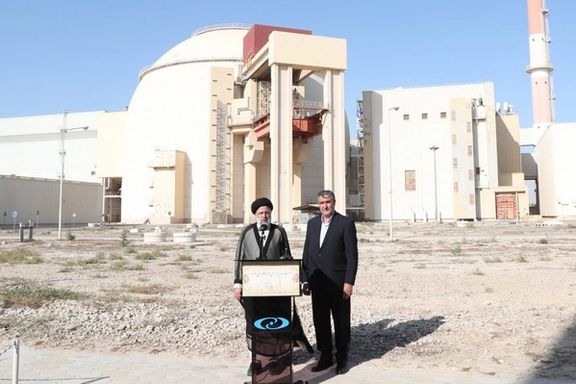
Iran's nuclear chief says construction projects for phase two and three of the Bushehr Nuclear Power Plant have accelerated since a few months ago.

Iran's nuclear chief says construction projects for phase two and three of the Bushehr Nuclear Power Plant have accelerated since a few months ago.
Mohammad Eslami, vice president and the head of the Atomic Energy Organization of Iran (AEOI), said on Friday that since President Ebrahim Raisi made a visit to the site in January, the pace of the projects have changed thanks to the president’s emphasis.
Eslami did not elaborate on the details nor did he mention that Russia is responsible for the projects.
Vienna negotiations hit a bump in the road on March 5 when Russia asked that sanctions for its invasion of Ukraine should not impact implementation of a revived 2015 nuclear deal , the JCPOA. Moscow later said it received the needed assurances from the US.
The Bushehr reactor is not part of the current nuclear dispute between the West and Iran, as Russia handles the nuclear fuel cycle. Iran has been enriching uranium and stockpiling more purified fissile material at other facilities.
The United States had expressed reservations about Russia building the Bushehr nuclear power plant but finally relented in late 2000s, saying that as long as Russia controls the fuel, it did not see the project as a proliferation risk.
Russia commissioned Iran's first nuclear power plant, Bushehr, in 2011. It has one operational unit that generates 1,000 megawatts, providing less than two percent of the country’s electricity.
Iran is expanding the Bushehr reactor to generate more electricity as the country suffers from a chronic shortage of electrical power, with daily outages that cripple industry and anger home consumers.

United Nations nuclear chief Rafael Mariano Grossi reiterated in an interview published Friday that he had “very limited visibility” of Iran’s atomic program.
Around six weeks after Grossi, director-general of the International Atomic Energy Agency (IAEA), said June 9 that four weeks remained during which he could certify the peaceful nature of Iran’s nuclear work, he told the Spanish newspaper El Pais that Iran’s nuclear work was “galloping ahead.”
Iran began restricting IAEA access to that required under the Nuclear Non-Proliferation Treaty at the end of 2020 after its nuclear scientist Mohsen Fakhrizadeh was killed. Iran announced its latest steps downscaling agency monitoring equipment June 8 after the IAEA board passed a critical motion moved by the United States and some European countries.
Grossi told El Pais that even if stalled negotiations succeeded in reviving the 2015 nuclear deal, under which the agency had extensive inspection powers, there would remain a period for which he lacked knowledge. He did, however, moderate his June 9 comments.
“If there is an agreement [to restore the 2015 deal, the JCPOA, Joint Comprehensive Plan of Action], it is going to be very difficult for me to reconstruct the puzzle of this whole period of forced blindness,” Grossi said. “It is not impossible, but it is going to require a very complex task and perhaps some specific agreements.”
Iran has breached several JCPOA restrictions on its nuclear program, which it began doing in 2019, the year after the United States, under President Donald Trump, withdrew from the agreement and imposed draconian sanctions on Iran.
Grossi expressed to El Pais concern over the number of centrifuges, used to enrich uranium, Iran is either constructing or has in operation. Both numbers and type were limited by the JCPOA.
Fragile database
“The agency needed to reconstruct a database, without which any agreement will rest on a very fragile basis, because if we don't know what's there, how can we determine how much material to export, how many centrifuges to leave unused?” Grossi asked.
The number and kind of centrifuges Iran operates, or has ready, determines how quickly it could enrich sufficient ‘weapons grade’ uranium, generally taken to be 90 percent purity, for a bomb. Iran currently enriches to 60 percent, way above the JCPOA limit of 3.65 percent.
The US Special Envoy for Iran Rob Malley said Tuesday Iran was “a few weeks” from having enough sufficiently enriched uranium for a bomb “it if chooses to enrich at that level,” although weaponization would take longer.
US-Iran Talks over JCPOA restoration seem stuck, despite diplomatic efforts by the European Union, with some analysts arguing both sides await the outcome of November’s US mid-term Congressional elections. For now, both Tehran and Washington are dealing with domestic critics and arguing the onus lies with the other.
Iranian foreign minister Hossein Amir-Abdollahian repeated Friday that Iran wanted US assurances it would get the “full economic benefits of the agreement.” He said Iran would not be “bitten twice,” referring to Tehran’s argument that when the US was ‘in’ the JCPOA, it used other means than direct sanctions to restrict Iran’s access to world trade.
One economic imperative for Iran is foreign investments, which might prove hard to secure given the closed nature of its government-controlled economy and its image as an un-hospitable country for foreign businesses.
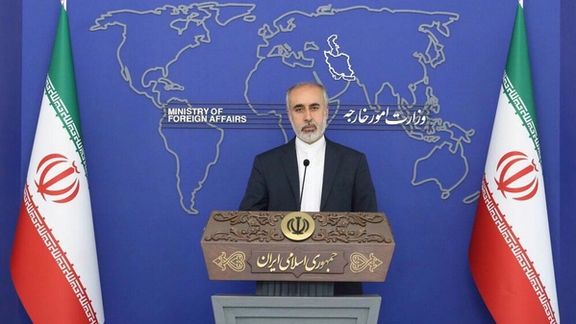
Iran says its relations with neighbors are not tied to the revival of the 2015 nuclear agreement (JCPOA) or permission from the United States.
Foreign ministry spokesperson Nasser Kanaani tweeted on Friday in English that the “false dichotomy between JCPOA, of which Iran unlike US remains a party, and good ties between Iran and its neighbors, including Russia, doesn't hide the fact that indecision of the unfaithful US is the main hurdle for a deal.”
He added, “Our neighborly policy is not contingent on JCPOA or US permission.”
Kanaani made the comments in reaction to remarks by US Special Envoy for Iran Robert Malley who said Iran either agrees to return to the nuclear deal and mend its relations with the world or stick to Russia and become more isolated.
Following a trip to Tehran by Russian President Vladimir Putin this week, Malley, said on July 19 that Iran "can opt for a position of relative dependency on Russia ... or it can choose to come back into the deal that’s been negotiated."
Echoing the comment, State Department Spokesperson Ned Price said on July 20 that Iran has a choice; siding with Russia, or choosing the path of diplomacy and taking up the deal that has been on the table for some time now, to have an economic relationship with other countries around the world.
On July 21, Foreign Minister Hossein Amir-Abdollahian said Iran is making efforts to strengthen relations with its Persian Gulf neighbors, UAE and Kuwait, noting that both countries will be sending their envoys to Tehran soon.
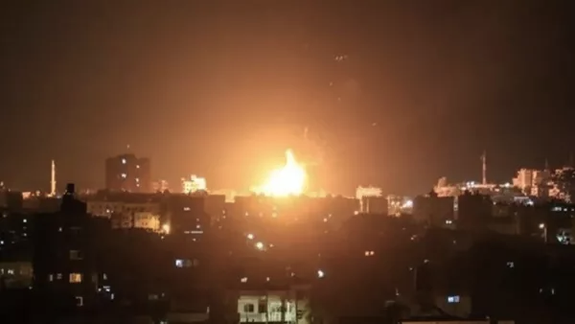
The top US Air Force general in the Middle East warned of increasing attacks by Iran-backed militias against the United States and its allies as tensions rise in the region.
As he stepped into his new role -- with responsibility for military operations in Iraq, Syria, Afghanistan, and across the region, Lt. Gen. Alexus Grynkewich told reporters at al-Udeid Air Base in Qatar on Thursday that such assaults could lead to a new escalation, while Russia and China are vying for economic and military influence across the Mideast.
“We’re in this position where we’re not under attack constantly, but we do see planning for attacks ongoing. Something will occur that unleashes that planning and that preparation against us,” Grynkewich said.
He also expressed concerns about Iran preparing to send Russia armed and unarmed drones to use in its war on Ukraine, saying it “is not a surprise … but it’s concerning.”
He also referred to Tehran’s rapidly growing stockpile of near-weapons-grade nuclear fuel in recent months, saying, “Everyone in the region is very concerned.”
His remarks came as the Syrian defense ministry said an Israeli strike killed three Syrian soldiers and wounded seven others near Damascus early Friday.
According to The Syrian Observatory for Human Rights war monitor the attack targeted an "Iranian weapons depot", an air force intelligence facility and a high-ranking officer's office, as well as a car near the Mezzeh military airport.
It said three Syrians were killed in military positions hosting air defense batteries in the perimeter of the Mezzeh airbase, as well as three non-Syrians and two “collaborators” of the Iran-backed Lebanese Hezbollah group at a workshop for manufacturing Iranian drones near the town of Sayyidah Zaynab, commonly known as Sitt Zaynab, 10 kilometers south of Damascus.
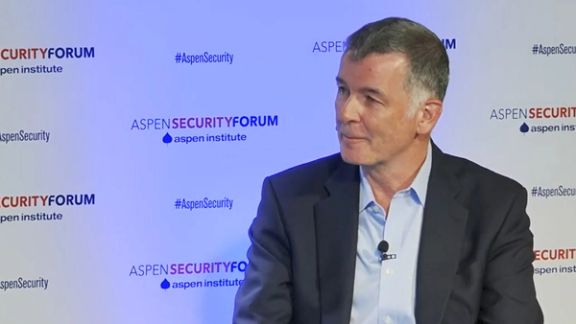
US State Department Thursday said remarks by Britain’s spy chief that Iran is not interested in a nuclear deal, did not need any special intelligence insight.
Richard Moore, chief of the Secret Intelligence Service (SIS) known as MI6, speaking at the Aspen Security Forum in Colorado, he was skeptical that Iran’s Supreme Leader Ali Khamenei wants to revive the 2015 nuclear agreement known as the JCPOA.
"I'm not convinced we're going to get there. ... I don't think the Supreme Leader of Iran wants to cut a deal," Moore said and added, "The Iranians won't want to end the talks either, so they could run on for a bit."
Asked about these remarks during the State Department briefing on Thursday, spokesperson Ned Price said, “I…don’t think you need a security clearance to discern the fact that Iran at this point doesn’t seem to have made the political decision – or decisions, I should say – necessary to achieve a mutual return to compliance with the JCPOA.”
After almost 16 months of negotiations with Iran and seven months after Washington says a final draft was offered to Tehran, negotiations remain stalled, as Iran seems to demand more concessions. More pundits and critics of the Biden strategy have begun to say that Iran simply wants to drag out the talks to prevent any decisive decision in Washington, while expanding its nuclear program to the point of a nuclear threshold state.
Price in his comments Thursday agreed with Moore’s assessment. The fact is that a deal has been on the table for months now. We have continued to engage in indirect diplomacy with Iran, courtesy of the efforts of the European Union and other partners, but Iran, to this point at least, has not displayed an inclination to seek that deal. So certainly, those comments ring true,” he said.
Iran’s former president Hassan Rouhani told his former aides in Tehran earlier this week that he could have made a deal with the new Biden Administration as early as March 2021 but the hardliners in parliament blocked any progress in the talks by passing legislation to intensify uranium enrichment and reducing UN inspections.
But the Biden Administration still argues that diplomacy remains the best option to restrain Iran’s nuclear program.
The British spy chief who said he agrees with the diplomatic option said, "I think the deal is absolutely on the table. And the European powers and the (US) administration here are very clear on that. And I don't think that the Chinese and Russians, on this issue, would block it. But I don't think the Iranians want it.”
Speaking later in the day at the Aspen forum, Israel's defense minister Benny Gantz said Israel had the military capability to prevent Iran from obtaining a nuclear weapon, if it came to that as a last resort.
"Should we be able to conduct military operation to prevent it, if needed? The answer is yes. Are we building the ability? Yes. Should we use it as a last (resort)? Yes. And I hope that we will get United States' support," Gantz said.
Bahrain's Undersecretary of Political Affairs Sheikh Abdulla bin Ahmed bin Abdulla Al Khalifa declined to directly answer a question about whether his country might participate in pre-emptive military action against Iran's nuclear program.
But when asked whether it would be fair to interpret his answer as "an ambiguous maybe," he quipped: "Fair enough."
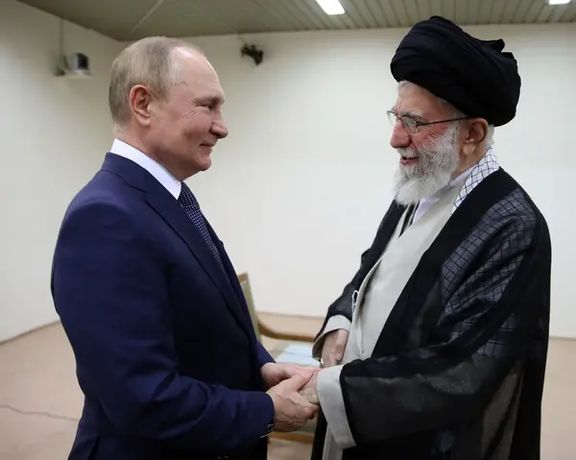
Iranian Supreme Leader’s endorsement of the Russian invasion of Ukraine is not surprising, Speaker of the US House of Representative Nancy Pelosi said Thursday.
Asked by Iran International correspondent Arash Aalaei about Islamic Republic’s ruler, Ali Khamenei praising Vladimir Putin’s “initiative” to invade Ukraine, Pelosi said, “Tyrants find their friends and there’s no surprise in any of that. I don’t think anybody has ever recognized Khamenei as a respecter of boundaries or people.”
During Putin’s trip to Tehran July 19, Khamenei lauded the Russian leader’s initiative in attacking Ukraine, saying that NATO would have launched a war sooner or later in Ukraine.
Pelosi added, “To me what Khamenei said was practically irrelevant, but what is relevant is the weapons he may supply Russia with.”
The United States has warned that Russia is preparing to receive Iranian military drones to use in Ukraine and has even sent teams to Iran to review its options. Iran has half-heartedly denied the accusation, but Khamenei’s strong endorsement of the invasion is a signal that Tehran would have little hesitation in supplying the drones.
Pelosi sounded resigned that Iran will cooperate with Russia. “It’s tyrant-to tyrant; doesn’t matter what any of us think; it’s what they will do,” she said.